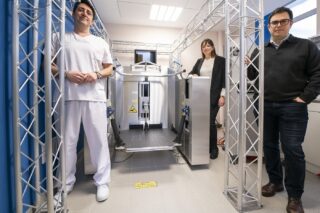Faster appointments, improved access and flexible hours—telemedicine offers an array of benefits within a range of medical fields. But how effective is it within obstetrics and gynecology for women and does it present challenges?
Dr. Helena Kopp Kallner is one of the many healthcare professionals in the field who has seen the use of telemedicine soar since the Covid-19 pandemic.
A practicing Senior Consultant in Obstetrics and Gynecology at Danderyd Hospital, Stockholm, she is also an Associate Professor and Senior Lecturer carrying out research at the Karolinska Institutet and is President of the European Society of Contraception and Reproductive Health. She said:
“I carry out telemedicine appointments myself in obstetrics and gynecology and am absolutely convinced this is the future. I think there’s a lot of potential for its use but I am also concerned that there are limitations and elements that have to be evaluated.”
Facing Challenges
Dr. Kopp Kallner is involved in research in abortion and contraceptives and teams at the Karolinska Institutet have carried out studies on the use of telemedicine in both areas. She explained:
“With contraception, the most effective methods—and the methods that have the highest acceptability among women—are the long-acting ones that require a visit.
Intrauterine devices (IUDs) and implants have to be inserted and you can’t do that through telemedicine but you could have the counseling via telemedicine and then just one visit to a specialized clinic for the insertion.”
But this becomes a problem if women don’t want to make a visit as it means they won’t be able to use the most effective methods of contraception.
“And it’s a problem if providers feel that they have to operate only through telemedicine because then they won’t advise using these methods.”
Telemedicine for abortion is not currently possible where laws require women to visit hospitals to collect their initial medication. Dr. Kopp Kallner said:
“Abortion care laws would need to be adapted so people aren’t required to come for on-site visits. Otherwise, I see less of a challenge here.
We have to evaluate the algorithms we use to select those requiring a visit so we don’t miss pregnancies that are too far in gestational length, which might make it more dangerous or painful for women to be at home.
We must also look at the algorithms so we don’t miss ectopic or other abnormal pregnancies. These women need to come for an examination.”
Remote Counseling
Dr. Kopp Kallner carries out telemedicine counseling for those with premenstrual dysphoric disorder, while a colleague provides menopausal hormone therapy counseling. She continued:
“We just have to make sure women have had their mammograms and that we know their blood pressure is fine, then we can do this counseling online.
Post-partum breastfeeding advice, where we can watch the baby feeding via a camera can also work very well.”
In some situations, telemedicine could even work where women at risk of pre-eclampsia or gestational diabetes are given devices to monitor their own blood pressure or glucose levels at home. New cutting-edge devices can also monitor vital signs and send the results to healthcare professionals in real-time.
“There will, however, always be a role for some face-to-face appointments and check-ups. Anything that requires a physical examination for proper diagnosis and treatment would have to be ruled out for telemedicine. You cannot carry out a full gynecological examination this way.”

Telemedicine could be successful in reaching women in geographically in accessible areas. It might also be a solution for women in small communities who desire anonymity.
“However, there is the issue that you never know who is listening—there might be an abusive partner or parent out of sight. When we have young women as patients we always try to have a minute or two alone with them just to check everything is OK. And this can’t be done through telemedicine.”
Quick Access to an Expert
Dr. Melanie Davis-Hall is a General Practitioner (GP), Clinical Editor and Medical Director for The Lowdown, a reproductive and sexual health platform in the UK. She explained:
“We use our innovative community-first approach to put women in control of their healthcare decisions through our unique dataset, digital tools and advice and prescriptions services.”
The Lowdown’s telemedicine service for women’s health consultations was launched in 2020. She added:
“These are generally one-off consultations around contraception or a women’s health issue or concern focused on listening and providing advice and guidance.
Our expert women’s health GPs are able to discuss issues with people around the UK, enabling quick access to a professional with expertise in this area and empowering women to navigate their healthcare appointments with the knowledge and understanding of their issue or condition and the research behind it.”

She agrees a major challenge of telemedicine is the lack of physical examination, which in some settings could delay care.
“People who struggle with access to digital services or digital literacy may find the process of booking an appointment or having a video call difficult or intimidating, which can be a barrier to equitable access.”
Both Dr. Davis-Hall and Dr. Kopp Kallner agree that despite its limitations, telemedicine could be an effective adjunct to traditional obstetrics and gynecology services for many women. Dr. Davis-Hall said:
“Telemedicine will become increasingly important to help distribute access to prompt and specialist care no matter where you are in the country.
It also allows you the ability to fit in appointments around other commitments and not have to leave work or school for a 10-minute follow up with your doctor or nurse.”
And Dr. Kopp Kallner added:
“You have to take into account that telemedicine isn’t for everybody. I think we should be able to provide telemedicine and in-person appointments and it should be up to women to decide.
That is the most important function of telemedicine—to increase choice rather than to be a substitute.”











